Cultural Resources

“WHO SO EVER WILL” SUNDAY
CULTURAL RESOURCES
Sunday, October 14, 2012
Nessette Falu, Guest Cultural Resource Commentator
Anthropology Ph.D. Student, Rice University; HIV/AIDS Physician Assistant
“No one who believes in him will be put to shame.” —Romans 10:11
I. Historical Moment: Whatever Happened to Whosoever Will?
The idea of belonging is deeply embedded in this historical moment. African American churches, or “black churches,” have historically served for many African Americans, or blacks, as a place for healing, spiritual nurturing, holistic stability, and even social networking and community building. Historically, black churches emerged as a result of segregation and ultimately served to provide a safe space for black people to worship and congregate.
However, like many other churches in the U.S. and around the world, it is an unspoken norm to allow feelings of shame as a motivating force to draw people to church. For example, seeking repentance of sins elicits and reinforces such feelings of shame for many Christians. Unfortunately, most black churches do not send clear messages across the pulpit that differentiate God-talk and prayer content for individuals with personal dilemmas—and circumstances (alcoholism, drugs, homelessness, violence, poverty, acceptance of gay sexuality) —from inappropriate linkages to socialized views placed on folk that can alter their self-worth, like shame.
The tug of war between feelings of wanting to belong and shame continues to be a struggle for most black gay folks within the black church community. Shame is the emotion that festers within many LGBT (lesbian, gay, bisexual, transgender) folks and causes low self-esteem, depression, rage, intimidation, and even suicide. Shame associated with being a gay person is not unique to the black community. However, unlike white communities, for example, the black gay community seeks black community camaraderie and acceptance for their social well-being and identity. Sociologist Mignon R. Moore writes in her 2011 book, Invisible Families: Gay Identities, Relationships, and Motherhood among Black Women, that many black gay women in New York City identify as black first then gay women. Their beliefs and ties to their black identity lead them to be more tolerant of the lack of acceptance by black churches for the sake of remaining within part of the black community.
Whosoever will is a phrase that has been historically used by preachers, theologians, and the church community to develop their messages for congregational speech. For example, you can find an online sermon by Minister Sam P. Jones who during his time (1847–1906) evangelized many through the ministry he led.1 The phrase is drawn (though not literally) from the Bible verse in Revelations 22:17: The Spirit and the bride say, “Come.” And let everyone who hears say, “Come.” And let everyone who is thirsty come. Let anyone who wishes take the water of life as a gift.” However, it has been also applied to Romans 10:112 because variations of this verse can suggest that the “whosoever” makes reference to anyone of any background such as race, gender, and class. Today, “whosoever” also includes within many sermons anyone of any sexual orientation. During slavery and even into the modern civil rights movement, there were hardly any gay black folks who were open about their sexuality and visible in private and public spaces about their sexuality. The phrase “whosoever will” expresses openness suggesting inclusion of anyone. However, as we all know, such inclusion in practice, language, and sentiment does not authentically and unapologetically express acceptance of gay sexuality in many black churches. Today, many black gay and allied heterosexual ministers, activists, scholars, and community members continually resist such contradictions. As a trans black woman says, “Whatever Happened to Whosoever Will?”3
II. Reflection upon Bayard Rustin’s Life
Bayard Rustin is best remembered for being the organizer of the 1963 March on Washington, working with Reverend Dr. Martin Luther King, Jr. This was one of the largest nonviolent protests in the history of the United States. Rustin was an openly gay man during most of his adult life and activism. Consequently, he was often arrested, beaten, and harassed for being an openly gay man. He was also silenced and even fired from important leadership positions during the civil rights movement because of his sexuality.
In the biographical film of Bayard Rustin, Brother Outsider: The Life of Bayard Rustin, Rustin shares some of this discontent with this unjust and discriminatory treatment in ways that portray his sadness and disappointment toward those he trusted most inside of the civil rights movement. However, it is most admirable to appreciate how resilient and committed Rustin was to the modern civil rights movement. Rustin was not involved nor in the forefront of the gay movement, which officially followed in 1969 as a result of the Stonewall Riots in New York City. Rustin was committed to the civil rights movement and freedom journey for the black community. However, Rustin, as exemplified in his life story as wanting and attempting to be an openly gay man, was also invested in achieving freedom for ALL black folks, including gay folks like himself.
Rustin understood what it meant to want to belong but have others constantly place before him the barrier of shame as a way to exclude him because he was a gay man. He was a close confidant of Dr. King and a trusted advisor to him leading Rustin to become the principal organizer of the 1963 March. King knew that Rustin was a gay man. However, King contributed to silencing his sexuality in spite of how much he trusted and loved him as a brother in the freedom movement. Rustin’s story is situated in a time of about 50 years ago, a time when openly black gay folks could be killed along with black heterosexual folks who tried to deviate from racist Jim Crow laws and underlying white societal attitudes. Today, films like Pariah, Brother to Brother, and Black Womyn Conversations remind us that many black gay men and women across all ages yearn, fight, and want to be accepted by their families, friends, churches, and the black community at large. Rustin’s story of faith, resilience, and doing the work of God must convince us that God’s work is not just within the Church but also within ourselves and across our broader social life.
III. Poetry and Spoken Word
Poetry
Dirty
by Raymond Berry
I have been made
Like those allowed within
They say I can love
Still know poison
Still cannot feel
Its own destruction.4
14.
by Marvin K. White
Write down their names.
Writing is magic. Is a grounding thing.
Connects floating stories to paper and to earth.
Write down their names.
The three that called you last night because they were
lonely or because somehow they thought that you could help them
understand their fear of greatness.
Write down their names.
Write down the one that spoke of family, the one of health and the other of
dreams.
Be where you supposed to be so you can receive the calls that
you supposed to receive.
You the go-to and the go-to-go too.
Hear yourself when you hear them speak.
Be spoken to. Be looked up and spoken down to.
All of it is good. You got wisdom on reserve.
Save a plate for stragglers and strangers and visitors and family and friends
who come by phone and foot with their weary tales or their victory
stories.
You will not be undone. Pray they come. Be what you pray for.
Practice knowing the difference between people’s receptions and
perception of you and of stories.
Show more gratitude. Even when you can’t think of nothing you thankful for.
Go deeper. Try sleeping for visions and not just for rest.
And rising early. Sleep for a word.
Sleep to get your breath back.
Sleep to get your inroads dug.
Visions coming.
remove any question from your hands as you write, build, bake, move
things, spin things.
Remove yourself from fights and battles, real and imagined.
Release persecution. You ain’t no pressure cooker.
Simmer down.
Show up.
Get to where you supposed to be, then maybe, just
maybe, somebody will be inspired, comforted, guided, unburdened
by seeing you being there.
Because of Sunday, Monday is.5
Spoken Word
Perceptibility for a Revolution in Reverse
by Nessette Falu
Medically perceiving, Many of You say or don’t say but show that you have fear…ur mind and emotions have been jolted in ways that escalate invisibly visible sensations of the unknown, a foreign sensation that initially looks and feels like death
But you seem to perceive a deadly voyage that is really not about the last heartbeat but the holt of all that you’ve come and hope to unfold into, the substance of your life
You’re 20yo, 32, 65, 3months, ur pregnant, ur a woman, man, transgender, gay, or lesbian or straight, or all three at times….the use of statistics say to me that your demographics count most as the cutting edge information for more medical funding…but you say, this is not all there is to you…
I stand in front of you with my stethoscope and writing pen ready to write for medications…but do I really hear you, do I really connect with you…is that enough, what does it mean to me? Really…You trust me to help put all this in perspective, medically…but how about socially, emotionally, politically, economically, sexually…
Am I part of this revolution….really? How many more medications do we need when the physiological grip that decompensate the body is not fear of death at this present time but of the ways that you wish to exist…without rejection and policing to have sex, love, intimacy, relationships, take medications in front of friends, tell your children, your lover. Immune system where are you…just wanting to TELL you how much the world has and continues to closet us….
My medical gaze lives in the world with you though not experiencing these roots of fear factors…but perhaps reproducing it…how far do I let my privilege of medically treating you obstruct destroying this social closet that the world has created, that we create with the fear factor of the HIV body….your perceptions are filtered not through your own constructing but that which has been written all over your body…the supposedly HIV/AIDS sick body
In earlier centuries germ theory generated magnitudes of societal fear toward an infectious body but your now sexualized body is feared even without contact, even when many of you are living healthier than the marginalizing invisible hand of power…dominating hands that refuse to accept that the sick or non-sick HIV CARRYING body has been failed by it
That’s what the closet generates…You’re positive, don’t want to be bothered with you, pls stay closeted…the HIV body is tangled in such an idea of privacy that its practices are blurred by a greater idea of being “closeted” and ultimately violated…Don’t come out, have fear, my domination of your closet is far more resilient than you…
Medically, socially, politically, intimately speaking, I come out as same-gender loving because I love me and love you. I resist being closeted because UR body is continually closeted and I have no more tolerance for it…We need a revolution in reverse…we need a destruction of perceptibility so you and I can live without a gaze of deviance of me and u and of medico-social death of u…6
IV. My Experience with LGBT Black Youth
In 2006–2007, as a student at the New York Theological Seminary, I interned for over a year at a LGBT homeless youth shelter in New York City called Sylvia Rivera’s Shelter. This shelter was part of the MCCNY Church located on 36th Street off 9th Avenue. Being a black gay woman myself, still adjusting to my own sexuality, I was not prepared for this ministry. In particular, the most challenging aspect of my internship was the interaction with the transgendered teens and young adult residents. I had never experienced sharing such a close space and interaction with transwomen and transmen, and their shelter experience complicated my own adjustment even more. It was very difficult to accept that families were so cruel to young black gay youth, resulting in their homelessness. Yet, the gay men, lesbians, and trans teens and young adults tried to live in the best harmony and community given their circumstances. Their experiences of survival and self-acceptance changed me deeply.
The transwomen and transmen made me uncomfortable at first. I did not have to deal with my own questions, uncertainties, biases, and ignorance about this subgroup population prior to my internship. Every day that I visited and worked at the shelter, I dealt and wrestled with myself more than anything. This struggle was good; to learn to dissipate my own biases and discomforts for the greater good of humanizing and not devaluing someone else’s life experiences and desired particularities when in need was good for the world. This was God’s work. Seminary taught me the value of ministering. The skills required to minister or to just be present with someone in need are not fully learned inside of a church. “You must step outside of your comfort zone!” is what I was always told in seminary. In Whether the Edge Gathers: Building a Community of Radical Inclusion, Rev. Yvette A. Flunder writes that radical inclusion builds community, heals cultural vulnerability, and transforms the church mission. I have heard Rev. Flunder preach. Her book and sermons helped me realize more about myself once I stepped into the zone of others who are extremely marginalized in society. I learned to love deeply the inner hope and resilience that many transwomen and transmen mirror to us. I did not have to give them meaning in order to affirm them. In Imaging Transgender: An Ethnography of a Category, David Valentine urges us to accept and understand transgenderism as a fluid experience and identity. This I learned to do, to allow them to speak and show me who they are and how I should be with them.
The LGBT black community will create spaces of belonging for themselves. They will gather to worship, to help others, to enjoy a movie, and live life like anyone else. The black community will be far more enriched and sustained if radical inclusion is practiced more. It would not seem or feel so radical if love for humanity is prioritized. This cannot be preached. It is a practice and self-revealing for whosoever will be.
V. Songs for This Moment on the Lectionary Calendar
In this questioning song, Ysaye Maria Barnwell of the group Sweet Honey In The Rock puts the issue before us across time and categories. The song calls to attention how too many of us see others in categories with a question of whether they are worthy to share space as neighbors and family members. And importantly, I ask, if I knocked on your door needing shelter from those who think that I should not be, would you “harbor me”?
Would You Harbor Me?
Would you harbor me?
Would I harbor you?
Would you harbor me?
Would I harbor you?
Would you harbor a Christian, a Muslim, a Jew, a heretic, convict, or spy?
Would you harbor a runaway woman or child, a poet, a prophet or king?
Would you harbor an exile, or a refuge, a person living with AIDS?
Would you harbor a Tubman, a Garrett, a Truth, a fugitive or a slave?
Would you harbor a Haitian, Korean, or Czech, a lesbian or a gay?
Would you harbor me?
Would I harbor you?...7
In the next featured song, we have through the pen of Hezekiah Walker what has become a type of “hospitality anthem” for the black church. The world of gospel music is filled with gay men and women who week in and week out render great service to churches around the country. In many cases, these churches accept the gifts of these men and women but will not accept them for who they are. Walker pushes the message that we are all a part of God’s body and we all need each other. There is no room for hate and harmful words if we recognize that we are all important to God and to the future of one another.
I Need You to Survive
by Hezekiah Walker
I need you, you need me.
We’re all a part of God’s body.
Stand with me, agree with me.
We’re all a part of God’s body.
It is his will that every need be supplied.
You are important to me, I need you to survive.
You are important to me, I need you to survive.
I need you, you need me.
We’re all a part of God’s body.
Stand with me, agree with me.
We’re all a part of God’s body.
It is his will that every need be supplied.
You are important to me, I need you to survive.
You are important to me, I need you to survive.
I pray for you, you pray for me.
I love you, I need you to survive.
I won’t harm you with words from my mouth.
I love you, I need you to survive.
(Repeat 6x)
It is his will, that every need be supplied.
You are important to me, I need you to survive.8
VI. Resources
Books
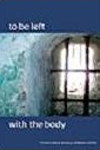 |
Clarke, Cheryl, and Steven G. Fullwood, eds.To Be Left with the Body. Los Angeles, CA: The AIDS Project, 2008. |
 |
Douglas, Kelly Brown. Sexuality and the Black Church: A Womanist Perspective. Maryknoll, NY: Orbis Books, 1999. |
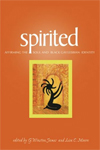 |
James, G. Winston, and Lisa Moore, eds. Spirited: Affirming the Soul and Black Gay/Lesbian Identity. Washington, D.C.: Redbone Press, 2006. |
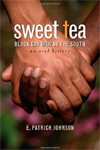 |
Johnson, E. Patrick. Sweet Tea: Black Gay Men of the South. Chapel Hill, NC: The University of North Carolina Press, 2008. |
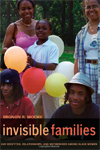 |
Moore, Mignon R. Invisible Families: Gay Identities, Relationships, and Motherhood among Black Women. Berkeley, CA: University of California Press, 2011. |
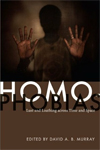 |
Murray, David A. B. Homophobias: Lust and Loathing Across Time and Space. Durham, NC: Duke University Press, 2009. |
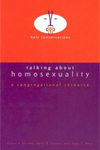 |
Olivero, Karen P., Kelly D. Turney, and Traci C. West. Talking about Homosexuality: A Congregational Resource. Cleveland, OH: The Pilgrim Press, 2005. |
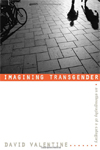 |
Valentine, David. Imaging Transgender: An Ethnography of a Category. Durham, NC: Duke University Press, 2007. |
Articles
Barnes, Sandra L. “Whosoever Will Let Her Come: Social Activism and Gender Inclusivity in the Black Church.” The Journal for the Scientific Study of Religion. 45:3 (371–387) Sept. 2006.
Shaw, Todd C., and Eric L. McDaniel. “‘Whosoever Will’: Black Theology, Homosexuality, and the Black Political Church.” National Political Science Review (2007).
McClerking, Harwood K., and Eric L. McDaniel. “Belonging and Doing: Political Churches and Black Political Participation.” Political Psychology (October 2005).
Films
Brother Outsider: The Life of Bayard Rustin. This film is about the life of Bayard Rustin, particularly during his years of activism working with Dr. Martin Luther King, Jr. On DVD.
Pariah. This 2011 film is still traveling for screenings in theaters. See the trailer at: http://focusfeatures.com/pariah
Black Womyn Conversations. 2007 by Tiona McClodden on DVD. This independent film is a series of monologues by black lesbians of all ages and backgrounds who speak out about race, gender, sexuality, religion, family, and more.
Brother to Brother. A 2004 film by Rodney Evans. DVD.
Gun Hill Road. This independent 2011 film is about a transgender youth who faces his released-from-jail Latino father from the Bronx. DVD.
Blogs
http://elixher.com
This blog focuses upon black gay women. The author of this commentary is featured in this blog.
http://www.bklynboihood.com
This website is about women of color who are masculine identified.
http://transgriot.blogspot.com/2010/06/whatever-happened-to-whosoever-will.html
This is a blog page written by a trans black woman who speaks about the black church and discrimination.
Notes
1. Online location: http://www.biblebelievers.com/jones_sam/jones_s05.html
2. Online location: http://bible.cc/romans/10-11.htm
3. Online location: http://transgriot.blogspot.com/2010/06/whatever-happened-to-whosoever-will.html
4. James, G. Winston, and Lisa Moore. Spirited: Affirming the Soul and Black Gay/Lesbian Identity. Washington, D.C: Redbone Press, 2006. This anthology is an amazing collection of short stories by black gay women and men about religious experiences across a diverse spectrum such as Christianity, Buddhism, Yoruba, and more.
5. Ibid.
6. Falu, Nessette. “Perceptibility for a Revolution in Reverse.” Performed at He(Art and Soul) in Houston, a Black Gay poetic space, 2010.
7. Barnwell, Ysaye M. “Would You Harbor Me?” 1994. Used with permission.
8. Walker, Hezekiah. “I Need You to Survive.” Hezekiah Walker and The Love Fellowship Choir. Family Affair II: Live at Radio City Music Hall. New York, NY: Verity, 2002.



